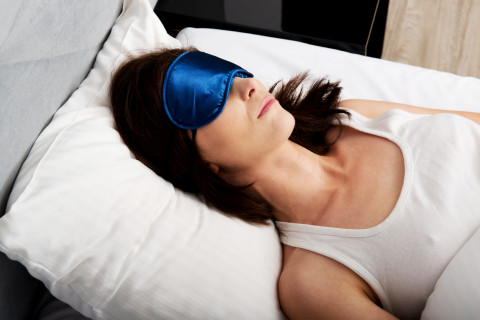This sounds too good to be true…
You gently drift off to sleep. Over the next eight hours, without effort on your part, your metabolism is boosted. Your appetite and weight-regulating hormones are re-balanced. You awake refreshed the next day, with all the energy you need to undertake the exercise regimen you’ve planned for yourself. As the days roll by, the extra pounds lift off you as if your weight loss program was on automatic pilot.
It’s a fantasy scenario for anyone wishing to lose weight
It may sound too good to be true, but a simple, ordinary, solid night’s sleep will give your weight-loss process a big boost. More than 50 published scientific studies have now established the relationship of sleep to body weight.
In one NIH research project, subjects were restricted to four hours sleep per night. After only a few nights, their metabolism had shifted, and their muscles were less efficient in absorbing glucose from the blood. What happens to glucose if your muscles don’t use it? It turns into a three letter word that begins with “F” and ends in “T”.
A second mechanism also kicks into action. If you’re deprived of sleep, your appetite-regulating hormones are thrown off. After only two nights of sleep deprivation, men had their ghrelin levels jump 28% – ghrelin is a hormone that stimulates appetite. At the same time, their leptin levels – which signals satiety – fell 18%.
According to Donald Hensrud, MD, from the Mayo Clinic, one study showed recurrent sleep deprivation in men increased their preferences for high-calorie foods and their overall calorie intake. In another study, women who slept less than six hours a night or more than nine hours were more likely to gain 11 pounds (5 kilograms) compared with women who slept seven hours a night. Other studies have found similar patterns in children and adolescents.
Sleep deprivation also contributes to depression. Once depression sets in, gaining weight is almost inevitable.
Perhaps of greatest importance is the role of sleep in enhancing learning. Your brain needs a period of sleep each night to sort through its new experiences, shifting data from short term memory into longer term storage. Losing weight with the Cognidiet is a learning process, not a rigid prescription about what you should or should not eat. To reinforce the neuroplasticity that the Cognidiet sets into motion, you need a good night’s sleep.
Getting a good night’s sleep is a bigger challenge than ever.
The current epidemic of obesity and overweight gets a lot of press coverage. And even if you don’t follow the news, just take a look around when you’re on the street to get a picture of the extent that Americans have grown fat.
But fewer people are aware of a second epidemic our society is facing – an unprecedented level of sleep deprivation and disturbed sleep, as demonstrated in a 1975-2006 NIH sleep survey.
Surveys have shown that the proportion of adults who get 6 or fewer hours sleep per night has increased from less than 2% in 1960, to 14% (1965), 20% in 1982, and a whopping 30% in 2004.
Is there a link between the epidemic of obesity and the prevalence of poor sleep? It’s probably more than a coincidence. Sleep is crucial to allow your brain, cells, organs and all the magical parts of your body to re-construct, rejuvenate and get ready for all the efforts and chemical reactions that will be needed the next day for you to think, act, perform, move, love, look good and be happy.
So here’s your good sleep prescription:
Why is poor sleep such a problem? Are Americans overworked and over stressed? Has our environment grown too noisy?
Whatever the cause, you can adopt a few simple strategies to reclaim your night.
• Don’t kid yourself. Some people tell themselves that they only need four or five hours sleep per night. There might be a few exceptional people for whom this is true, but the overwhelming likelihood is that you’re only fooling yourself.
• Keep to a set bedtime. Your brain likes to run on pre-set programs. If you train yourself to fall asleep at a particular hour, your brain will automatically start to feel tired when that time of the evening rolls around.
• Darken your room or wear a sleep mask. Light seeping into your room at night is a sure-fire killer of your beneficial deep-sleep brain waves.
• Quiet! If your room isn’t quiet, consider popping in a pair of ear plugs before you roll into bed.
• Avoid eating within an hour or two before bedtime, digestion will interfere with sleep. Also avoid cardio exercise – it will keep you awake, violent movies – they will put your brain in overdrive.
• Back lit computer and phone screens awaken your brain. They also emit unhealthy electro-magnetic waves. Avoid them for an hour before bed time (also avoid them around your bed and even in your bedroom). Instead, curl up with a good book.
• Time for a new mattress? Or pillow? Nothing ruins a good night’s sleep more than an uncomfortable position to sleep in. Investing in a new mattress or pillow might make a significant difference.
• Sleep apnea – a medical condition in which your breathing gets interrupted while you’re asleep – has become a fairly common problem. If you get up each morning without feeling fully rested, or if you have another reason to suspect that sleep apnea is a problem, consult your physician.
So for 2016, make it a resolution to sleep more, even one extra hour will make a difference. Plus new evidence shows it could add years to your life.
